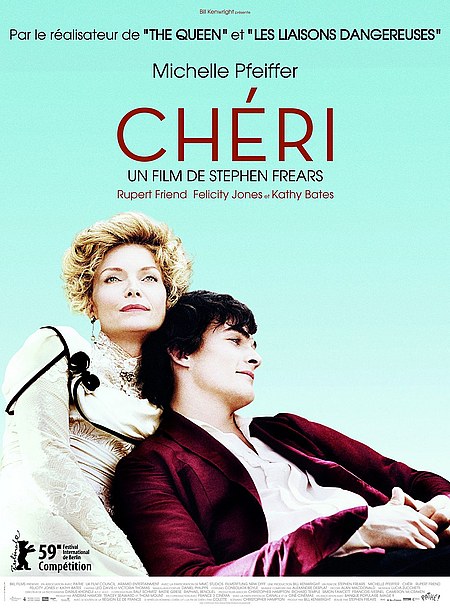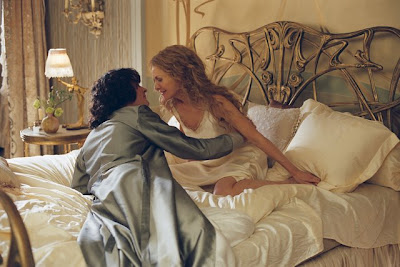
DVD Release Date:
October 20, 2009
October 20, 2009
Bookmark this on Delicious
Print Page
While the trailer for Miramax Film’s Chéri makes the reunion of Dangerous Liaisons director Stephen Frears, screenwriter Christopher Hampton (who also penned Atonement), and actress Michelle Pfeiffer look like an Oscar Wilde style romp set during the height of the Parisian Belle Epoque-- the film itself is more concerned with melancholic introspection than the number of laughs inserted in the succinct preview would lead you to believe.
Fittingly for the literal translation of Belle Epoque’s “beautiful age"-- the film is overflowing with the most sumptuous eye candy in terms of Alan MacDonalds’s intricate production design and the luscious costuming of Consolata Boyle which is captured to its most exquisitely beautiful effect by renowned cinematographer Darius Khondji whose work with Bertolucci, Fincher, Haneke, Jeunet, Polanski and Kar Wai has elevated even partially successful films like My Blueberry Nights just based on the breathtaking visuals alone.

And this is especially important in terms of Chéri which ultimately feels like it’s essentially much ado about nothing. Although par for the course of Frears’ resume of often garnering his actors and especially his leading ladies award nominations or statues a la The Queen, The Grifters, Dangerous Liaisons, Mrs. Henderson Presents etcetera-- Chéri boasts a winningly carefree Michelle Pfeiffer as Léa de Lonval.

One of the most influential and wealthy Parisian courtesans—after the departure of her most recent lover back to his Russian homeland—Léa contemplates retiring from “the business” as she nears the age of fifty. Yet, just when she’s ready to enjoy the life of luxury she can more than afford despite her lack of friends outside her own circle since others judge the way that arguably Belle Epoque’s most liberated and successful women earned their fortunes, she agrees to meet an older colleague she’s never much liked but merely tolerated in the form of Kathy Bates’ gossiping, self-obsessed and manipulative Charlotte Peloux.

Requesting Léa’s assistance to intervene in the meaningless hedonistic pursuits of her nineteen year old “bon vivant” son whom Léa has dubbed Chéri—as soon as Rupert Friend’s bored, personality free slacker meanders outside and sees his beloved near-godmother Léa waiting for him-- his interest is piqued, the sexual tension is palpable and after stealing a kiss from the woman nearly thirty years his senior, he accepts her offer to journey to her country home for a much needed rest.
Yet, as a nineteen year old with an out-of-control libido, the two embark on a torrid affair they assume will just be a fling as Léa tries to soothe his ails and return him to Peloux a few weeks later—teasing him from the start that she’s kissed the handsome mouths of men many times over and has never lost control before.
However, something clicks between the two and she finds his lack of direction fascinating as a few weeks turns into six years of what to everyone else appears to be a healthy, attentive romantic relationship despite both Léa and Chéri’s frequent attempts to dismiss it as just another short-lived rendezvous in the course of Léa’s chosen career.
And it’s this endless avoidance to not put their coupling into any specific terms or reveal their feelings that will ultimately lead to their heartbreak and doom when they hear from Peloux who—suddenly with a whim towards wanting grandchildren—has decided she needs Léa to return her son as though he was a present so that he can take part in an arranged marriage.
Going along with what Peloux wants despite a few telling instances where Chéri in particular tries to get Léa to stop bluffing and finally fold that their time together has been more than just a sensuous diversion—it’s from then on when the film’s tone shifts from the opening jovial narration and sexy sharp-witted barbs to a subtle and increasingly tragic rumination of missed opportunities, the nature of age, and the double standard of older women and younger men, until it ends with a literal bang off-screen.

The playful chemistry of the two leads and the film’s gorgeous attention to detail in bringing both of Colette’s novels Chéri and The Last of Chéri to life is made all the more sweeping due to the score created by Painted Veil and Benjamin Button composer Alexandre Desplat.
Yet despite this, I was left cold and unmoved by the lack of a cohesive structure for the second half of the movie which never seemed sure if it wanted to provide a subtle and doom ridden commentary on aging as well as societal attitudes towards both genders as we advance in years or if it wanted to instead fixate more purely on the leads’ impossible love.
And perhaps the problem in the tonal and thematic shifts can be blamed on the fact that two novels are being strung together in a mere one hundred minutes and the splicing together of two separate works makes it feel as though we’ve just heard a record skip or had a channel change unexpectedly on our television.

Overall, aside from the high quality craftsmanship, this misguided Colette adaptation plays best when you view it like you’re taking a trip through a Belle Epoque museum where everything feels lovely and natural (aside from Bates’ misstep in playing Peloux with a certain level of distracting camp better suited to Wilde).
Moreover, it does succeed in terms of relaying the author’s penchant for impressionistic writing but given the wonderful biography of Colette included in the production notes from Miramax Films, it makes you wish that instead of Chéri, the filmmakers would’ve dedicated their time to Hampton’s pet project biopic of the controversial author who would become most well known for penning Gigi.

Since, in addition to not being able to identify with this film’s characters-- or empathize with ones like the titular male lead who is repeatedly described as having no discernible personality--it fails miserably in the attempt to make it relatable or applicable to contemporary life. Thus a look at what made the author tick would’ve been infinitely preferable and more in line with the strengths of the Liaisons trio of Frears, Hampton and Pfeiffer than this particular exercise of Chéri.
















